Months after contracting COVID-19, some will try anything to regain their sense of smell
In her quest to overcome one of COVID-19's strangest symptoms, Mariana Castro-Salzman was willing to try anything.
The 32-year-old visited an oncologist and got a CT scan of her head. She saw an ear, nose and throat doctor. Took steroids. Went to a neurologist who put her on anti-anxiety medication.
She began sniffing essential oils every day. A homeopath prescribed bath flowers, supplements and chaga mushrooms.
And yet, nearly a year after recovering from the coronavirus, her senses of smell and taste are still scrambled. Onions and garlic evoke a nausea that has nothing to do with their actual scent. Coffee smells like a burned tire, but worse.
Because of the distorted smells, a condition known as parosmia, she has endured headaches, lost weight and repeatedly broken down in tears.
"It's like a mind game, because you remember all the smells and tastes, but then the second you put it in your mouth it's nothing like it used to be," the Los Angeles resident said. "It's like a completely different experience."
Loss of taste or smell may be the first thing that prompts someone to get tested for a coronavirus infection. Some studies, in fact, have found it to be the best predictor, the symptom that practically screams, "I've got COVID!" (Researchers have even questioned whether smell tests are a better screening tool than temperature checks.)
But though a majority of people recover their senses within weeks, 10% suffer long-term smell dysfunction, some researchers estimate. In Castro-Salzman's case, it started out with anosmia — complete loss of smell — before developing into parosmia.
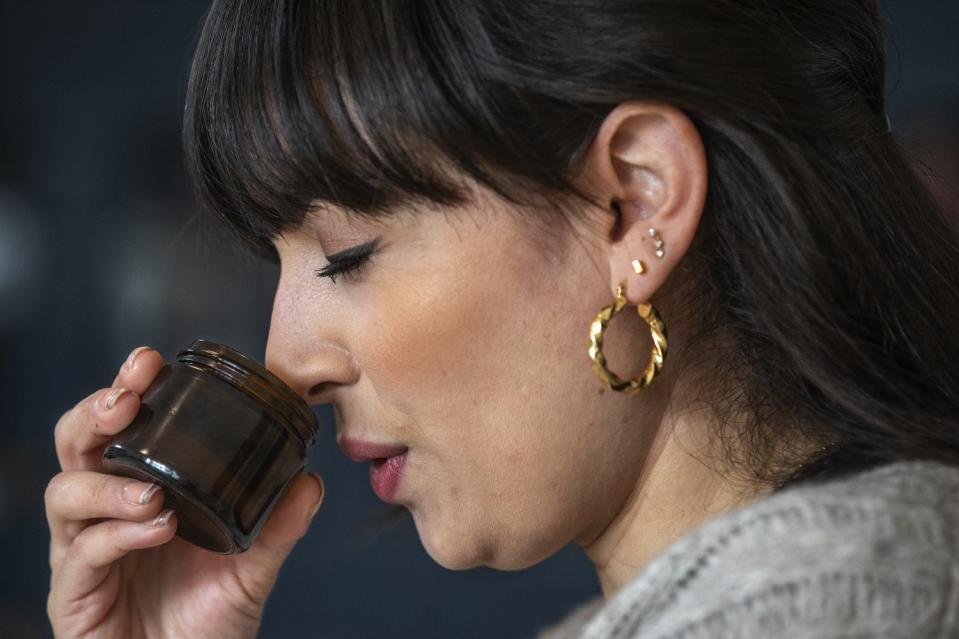
Smell is instrumental in our perception of flavors, allowing us to differentiate strawberry from raspberry ice cream and warning us when food is spoiled. It keeps us safe — when we catch a whiff of smoke that signals fire or gas that signals a leak. It's tied to our memories, transporting us back to a person or place we love.
People dealing with smell dysfunction have scheduled medical appointments, joined support groups and spent months using smell kits to retrain their noses. Universities have launched studies on recovering smell after COVID-19, starting treatment trials using nasal rinses and essential oils.
The business of olfaction restoration is booming.
"This COVID situation with the smell loss has really put into spotlight the olfaction," said Dr. Bozena Wrobel, a rhinologist and skull base surgeon with Keck Medicine of USC.
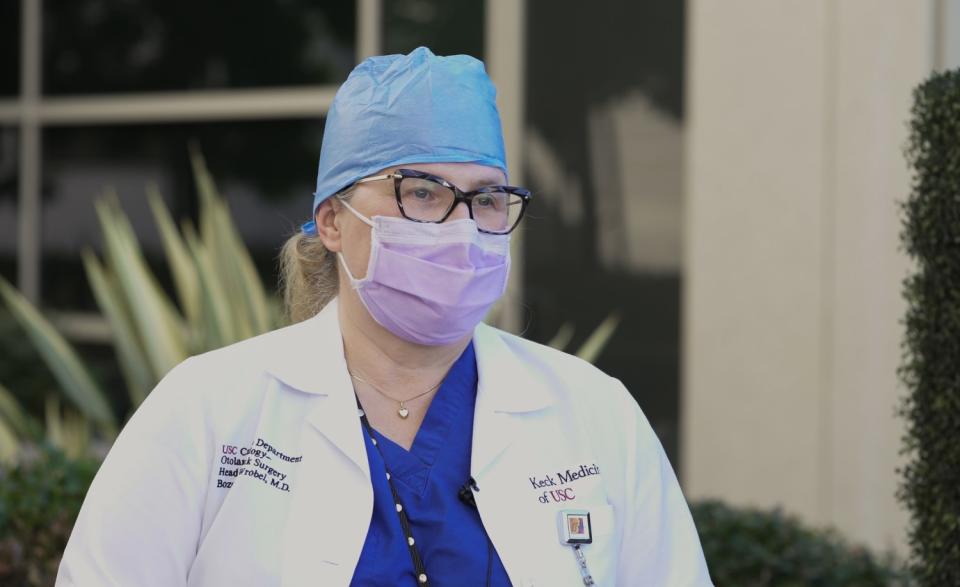
AbScent, a United Kingdom charity that helps those suffering smell loss or disorders, saw its membership jump from 1,500 in February 2020 to more than 40,000. Its Facebook group dedicated to COVID-19 smell and taste loss includes posts from people who were unable to enjoy holiday meals, mothers who can't appreciate the scent of their newborns and members who are swapping tips on "safe foods" for people with parosmia.
Are they grateful they weren't placed on ventilators, that their lungs weren't left scarred and that they didn't die? Yes. But there's a reason the words "stop and smell the roses" continue to pop up in books, greeting cards and country music: Smell can remind us that life can be glorious.
“Once you have smell, you think it's there forever," Castro-Salzman said. "For me, it was like losing something very precious. ... It's like a living nightmare."
::
Even before the pandemic hit, a small percentage of the population dealt with anosmia for a variety of reasons, including upper-respiratory viruses, head trauma and polyps. For others, it's the first sign of a neurodegenerative disorder, such as Alzheimer's or Parkinson's disease. Sometimes people are born without a sense of smell or lose it as they age.
It's not entirely clear what causes COVID-related anosmia (and, later, parosmia), although scientists believe the virus affects supporting cells that are crucial for the healthy function of olfactory neurons — which detect and transmit odorant information to the brain. The Centers for Disease Control and Prevention cites smell and taste problems as a long-term complication.
When Castro-Salzman lost her sense of smell and taste in early March 2020, after attending a Keane concert in Hollywood, her doctors told her it was probably a sinus infection. But a few days after reading an article linking those symptoms to COVID-19, she decided to get tested for the coronavirus. She was positive.
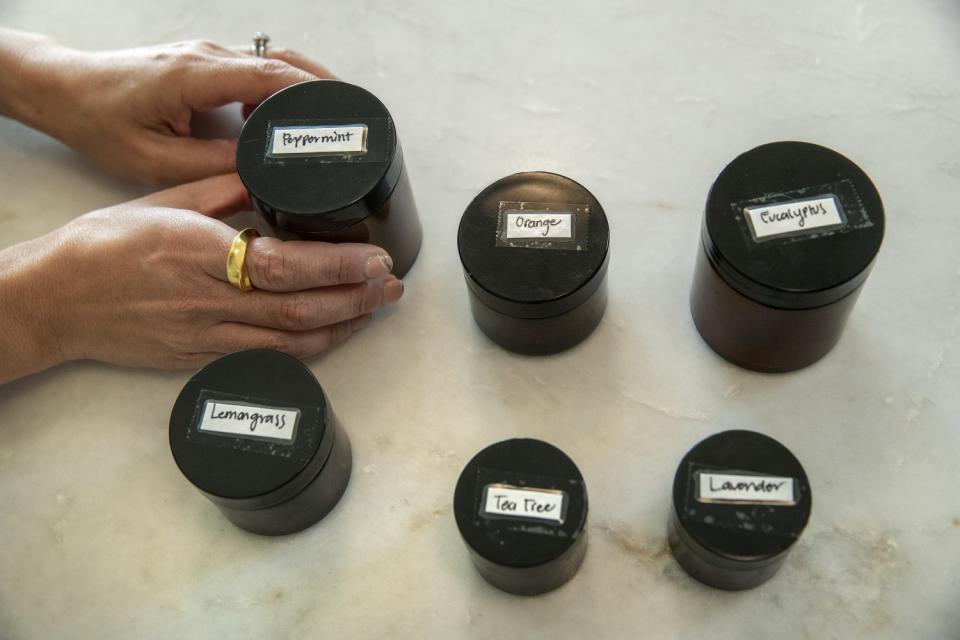
She suffered a headache, body aches and fatigue, although those were short-lived. Her loss of smell and taste lasted almost two months. She couldn't smell her husband or her sister. They're smells we don't necessarily think of, "but when they're gone, you're like, 'Wait a minute,'" she said.
It wasn't until May or June that her senses were back at 50%, she said. The first time she was able to smell her dog again, she cried.
But in July, everything turned upside down once more. Flavored drinks started tasting metallic and rotten. Spices, cilantro and onion suddenly tasted off. She couldn't eat meat or vegetables if they were grilled. Soon, she'd lost about 10 pounds.
In August, while on location in downtown L.A. for her job as a costumer, everything — the air, the coffee shop, a nearby generator — smelled like burned rubber. The smells were so overwhelmingly bad, she suffered headaches. That night, she went home and sobbed.
"I just felt like nobody understood what I was going through. It's not like you break a leg and people understand that you can't walk," Castro-Salzman said. "I had to explain to them all the weird smells and, like, how depressing [it is] and how much anxiety you get from it."
Jay Piccirillo, a professor of otolaryngology at Washington University School of Medicine in St. Louis, likens parosmia to wires that have gotten crossed, "like in your house when you turn on the light, the dishwasher goes on."
Pamela Dalton, who studies smell’s link to cognition and emotion at the Monell Chemical Senses Center in Philadelphia, says the errant smells may actually be an encouraging sign that the olfactory receptor neurons in the nose are trying to restore their proper connections in the brain.
“They don’t always make the right connections” when they’re attempting to regrow, Dalton said. “At that point, you are smelling chocolate and it smells like dirt or dog poop. … I don’t think we really know exactly how long this might go on.”
::
Susan Robbins Newirth, a Realtor, thought she was on the road to recovery after enduring complete smell loss for about two months beginning in March 2020. During that time, the 56-year-old said, it "felt like someone had stuck a balloon up my nose and blown it up."
As she started to feel better, she could pick up the scent of vanilla and thought “hallelujah, it’s coming back.” But over the next month, there was no progression. She feared she would never achieve a full recovery.
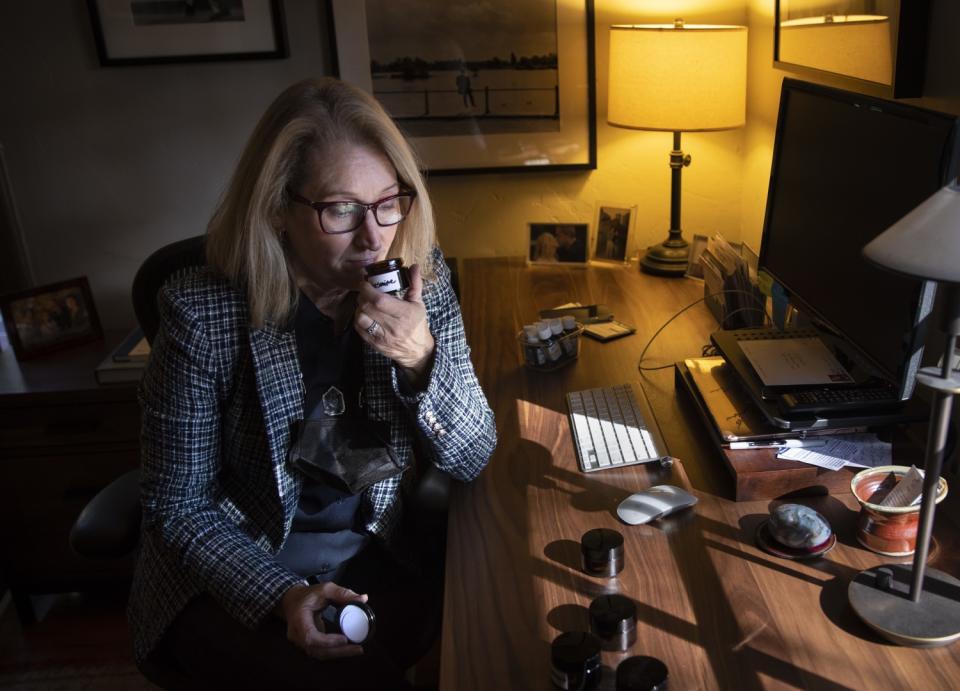
Then, in July, a sudden odor made her think she needed to take out the trash. She sprayed Febreze in her Santa Monica home, but the perception of a horrible smell wouldn't go away. She usually refers to the nauseating aroma that has invaded her nostrils since parosmia as "the COVID smell."
Sometimes, when she's around coffee, it's as though she's smelling stinky, sweaty socks that have been worn for days — mixed with burned rubber. It's an odor, she said, that creeps up your nose "and gets into your taste buds." And yet, she still drinks java because she needs the caffeine boost.
She used to love lavender, but now it makes her sick to her stomach. Also on the no-smell list are cucumbers, meat, garlic and onions. Her diet consists mostly of pasta, potatoes, bread and cheese.
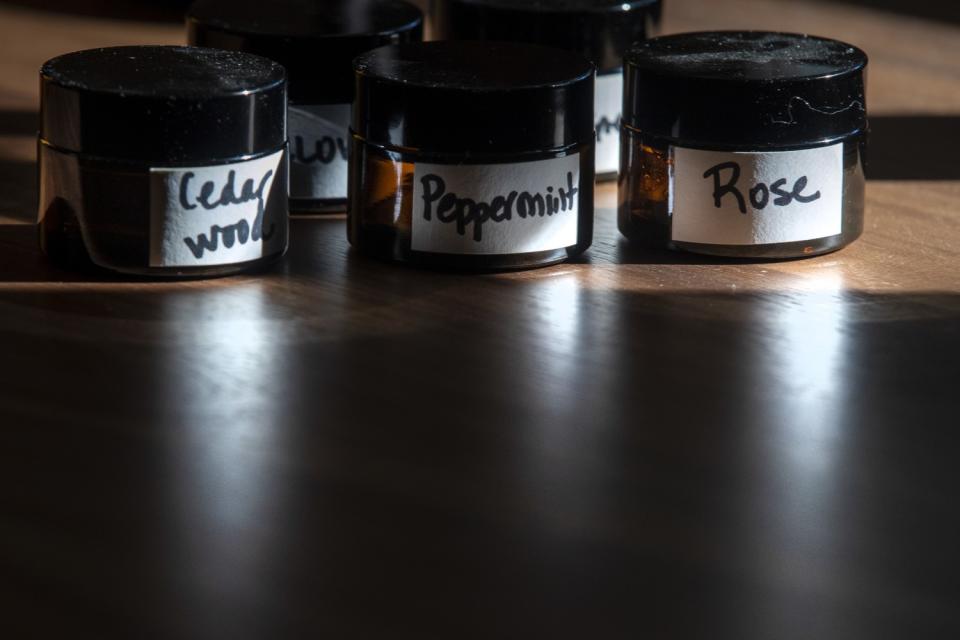
While making Thanksgiving dinner, she had to wear an N95 mask because of the "stench" of the turkey and the onion, sage and thyme she added to the stuffing. For Christmas, her husband gave her a nose plug.
"Until you are experiencing it, you don't really realize how depressing it can be," she said. "It gets into your psyche."
For Viviana Villaseñor, who lives in Chula Vista, everything smelled like smoke before eventually developing into parosmia. She misses the scent of her 7-year-old son, salty beach air and the smell of earth when it rains.
In March, Brooke Adams lost her boyfriend of 10 years to COVID-19. The La Jolla resident tries to sniff his cologne bottle for comfort, but there's none to be found. Instead of smelling notes of grapefruit, bergamot or rosemary, her body tells her it's a noxious chemical scent.
Nearly a year after getting COVID-19, 27-year-old Stevie Gibbs smells almost nothing at all. The low point was the day she didn't realize there was a fire in her trash can until she spotted the smoke. The consumption of food, she says, became a matter of sustenance rather than joy.
In June, the Loz Feliz resident met Dr. Wrobel and took a scratch-and-sniff test to determine her degree of smell loss. She couldn't detect any of the fragrances. Under Wrobel's advisement, Gibbs began smell training.
The purpose of such training, which has been used for at least a decade, is to stimulate the regenerative capacity of the olfactory system. Twice daily, people will smell a scent and try to recall the memory of it, like picturing cutting lemons while smelling the lemon essential oil.
"Almost like physical therapy for the olfactory nerve," Wrobel said.
For those dealing with parosmia, Dalton said, smell training "may be able to help reorganize the system the proper way again." People can pick core sets of scents using something from their spice cabinet, their shampoo or any item they recall prior to the loss.
In addition, there is evidence from olfactory training studies that "the earlier you start, the better the outcome," Dalton said.
At Washington University School of Medicine, research on smell loss and recovery after COVID-19 is ongoing. The university is currently conducting a clinical trial to see if smell training can help patients with anosmia.
Out of a list of about 34 essential oils, patients will pick the four they want to use to restore connections in the brain. Piccirillo said the most popularly requested smell — one they don't offer — is smoke.
"It means that for so many people who have lost their sense of smell, the fear of not being able to smell fire is so real,” Piccirillo said.
That danger became clear last month when a Texas teenager evacuated her family as a fire tore through their home. The other family members, all of whom had COVID-19, couldn't smell the smoke.
::
Castro-Salzman didn't start seriously doing smell training until August, at the peak of her parosmia. She made her own kit using makeup jars, putting drops of essential oil onto a paper towel she placed at the bottom of each one.
On a recent afternoon, she closed her eyes and dipped her nose into a jar scented with peppermint essential oil, her hands clasped around it like a cup of coffee she no longer enjoys.
For the 15 seconds she inhaled the scent at her kitchen counter, she visualized peppermint candy and toothpaste, which she'd had to abandon months before because the taste of mint was so awful to her.
She cycled through lemongrass, and thought about Thai food. The orange essential oil made her think of the beach and being able to eat the fruits she once loved. She saved her favorite for last: lavender.
It was the scent that seemed to be closest to reality, the one that reminded her of life pre-parosmia, "when everything just had the real smell."
It's a life she desperately hopes to regain.
This story originally appeared in Los Angeles Times.

